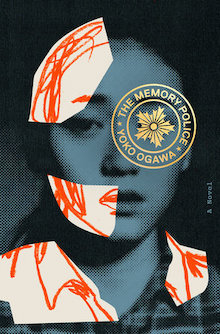“The Memory Police” by Yoko Ogawa [Why This Book Should Win]
Check in daily for new Why This Book Should Win posts covering all thirty-five titles longlisted for the 2020 Best Translated Book Awards.
Tony Malone is an Australian reviewer of fiction in translation, whose site, Tony’s Reading List, has been providing reviews continuously since 2009. His main focus is on Japanese and Korean literature, and he has covered over a hundred titles in each of these areas. Between 2012 and 2019, he was a member of a Shadow Panel working on the Independent Foreign Fiction Prize and then the Man Booker International Prize, chairing the group for several years. In addition, in his free time he enjoys translating from the German, and English translations of short pieces by Eduard von Keyserling, Ricarda Huch, and Karoline von Günderrode can also be found at his site.

The Memory Police by Yoko Ogawa, translated from the Japanese by Stephen Snyder (Pantheon)
To: the Person in charge at Middlebury College
Dear Dean/Professor/Academic Overlord (not sure how these things work at American universities)
I’m writing about one of your employees, Stephen Snyder, who (according to your website) is dean of the Language Schools and vice president for academic affairs. But this doesn’t really have anything to do with his Middlebury work, it’s about his moonlighting as a literary translator, which I bet you’re not all that keen on.
You see, a book he worked on, Yōko Ogawa’s The Memory Police, has been longlisted for this year’s Best Translated Book Award and (in my humble, well, not *that* humble opinion), it’s the best book on the list and is bound to win. So, what does that have to do with *you*, I hear you asking (I have great hearing). Well, let me tell you about the book first.
The Memory Police is set on a mysterious island where an equally mysterious law enforcement body makes sure that everyone forgets what they’re supposed to (quite why this happens no-one knows, but hey, don’t mess with the Memory Police, right?). You wake up one morning, and suddenly hats are gone—What are hats? What’s that thing on your head? You get my drift.
Anyway, the main character gets to know one of the few people who actually do remember when things are “disappeared,” and who don’t really like having to burn or throw away all their stuff (I’m sure you can sympathize, even from your imperial educational throne up there), and he tries to help her remember all the things that have disappeared. Not with much success, it has to be said, but you’ve got to give it a go, no?
So, on the one hand, what we have here is a great allegory of a totalitarian state, complete with cool boot-stomping policemen you could imagine in a Hollywood WWII movie (Jude Law? Rufus Sewell?), with the main character hiding the man with the memory away in a sort of mezzanine attic. The Diary of Anne Frank if you will, with more snow.
But, get this, that’s not really what it’s about. It’s all really a metaphor (you do metaphors, yeah, even at your lofty galaxy-governing level?) for the tyranny of memory loss and the way thoughts slip out of our heads as we get older, never to return. And, as if that’s not good enough, Ogawa does this really neat thing where the narrator is actually a writer and writes this totally cool story that kind of intertwines with what’s happening in the outside (inside?) world. It makes more sense when you read it, trust me.
Sounds good? It is, an excellent story, great to read, thought-provoking and something I’d recommend, even to a constellation-ruling university demigod like yourself. The longer it goes on, the less it makes sense (in a *good* way), but by the time you reach the end, you’ll know this is good shit (pardon my French), definitely a winner. Ask Steve, maybe he’ll give you a copy.
OK, so you’re probably wondering why I’m writing. Well, it’s pretty simple. Old Snyderman (a personal nickname, I think it’ll catch on) is Ogawa’s only translator into English, and so far he’s managed to do five of her books. Problem is, she’s written more than thirty . . . It’s been more than a decade since he started on this, and well, if he carries on at the current rate, it’ll take another fifty years for him to get through the rest. I don’t know about you, but I really don’t want to have to wait that long.
So here’s the thing—fire the lazy bum. You can hire a younger, more industrious academic for less money (let’s face it, there are a million post-docs out there just waiting for a job), and Stevie can get on with what he should be doing, translating Ogawa’s books. It’s a win-win situation, for me, for you, for Ogawa and for your legendary universe boss highness. You know it makes sense.
Hoping to hear from you soon.
Yours faithfully,
Tony Malone (of Tony’s Reading List, it’s a blog, check it out)

[…] asked to contribute a post on the book explaining why it should win. In the end, I came up with a tongue-in-cheek piece suggesting a way that Snyder’s bosses could make more time for him to work on Ogawa’s […]
[…] in English are always a cause for celebration (see my tongue-in-cheek whinge at her translator here), and The Memory Police doesn’t disappoint. You’ll come for the quasi-fascist […]